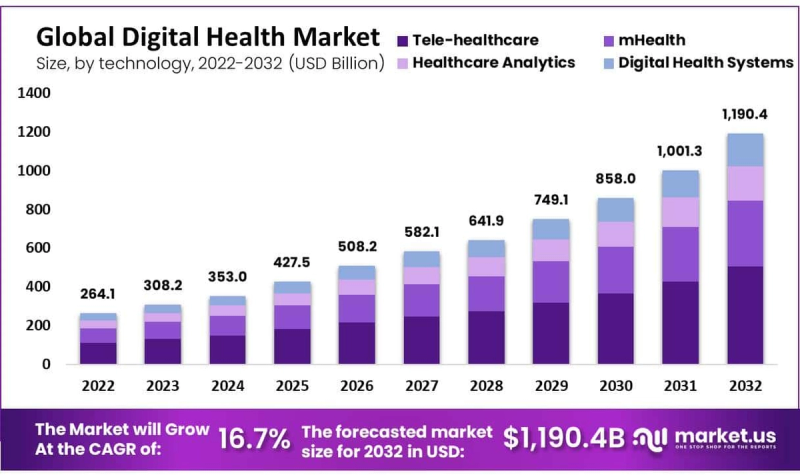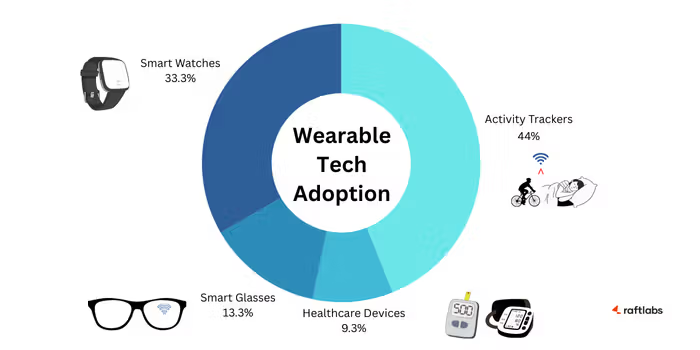
What’s Next for AI in Healthcare? A Comprehensive Analysis
- Riya Thambiraj
![Riya Thambiraj]()
- Artificial Intelligence
- Last updated on
The global healthcare IT market is booming, with a jump from USD 760.2 billion in 2024 to USD 1,834.3 billion by 2030—showing just how fast technology is transforming healthcare. This growth is driven by healthcare software development, which is at the heart of the industry's ongoing revolution.
Custom healthcare software development services are reshaping how care is delivered, improving patient outcomes, and streamlining operations in ways we’ve never seen before. From telemedicine platforms to electronic health records (EHRs), technology is pushing the boundaries of what’s possible in healthcare.
In this blog, we’ll explore the key areas where medical software development companies are making waves. Whether you’re part of a software development team, a healthcare provider, or an entrepreneur in the tech space, this is your chance to see where the future of healthcare is headed—and how you can be part of it.
Let’s start with how these innovations are enhancing patient care across the globe.

Source: https://media.market.us/digital-health-statistics/
In this blog, we’ll explore the key areas where healthcare software is making waves. Whether you’re part of a software development company, a healthcare provider, or an entrepreneur in the tech space, this is your chance to see where the future of healthcare is headed—and how you can be part of it.
Let’s start with how these innovations are enhancing patient care across the globe.
AI In Healthcare: A New Era Of Personalized Patient Care
At the heart of healthcare software is one powerful goal: improving patient care. AI-powered technology is allowing healthcare providers to offer more personalized, timely, and efficient services. Here’s how:
AI-Driven Electronic Health Records (EHRs): AI enhances EHRs by automating data analysis and identifying patterns in patient history. This enables faster diagnoses, tailored treatment plans, and reduced human error.
AI-Powered Telemedicine Solutions: Telemedicine platforms integrated with AI offer features like symptom checkers, automated follow-ups, and predictive analytics to improve virtual consultations. The telemedicine market, projected to exceed $130.5 billion by 2025, reflects this rapid adoption.
AI-Enabled Wearable Health Devices: Devices like fitness trackers and smartwatches use AI to provide real-time insights into patient health. These tools empower patients to monitor their conditions and share actionable data with providers, enabling proactive and collaborative care.

Now that we’ve seen how AI is elevating patient care, let’s explore how custom healthcare software development services, powered by AI, are streamlining operations behind the scenes.
How AI Can Help Streamline Healthcare Operations
Healthcare software isn’t just helping patients; it’s transforming how healthcare organizations run. By automating tasks and optimizing workflows, custom software is helping to reduce costs, improve resource allocation, and enhance overall operational efficiency. Consider the following:
Hospital Management Systems (HMS): Administrative tasks like appointment scheduling, patient record management, and billing can be time-consuming and prone to errors. HMS platforms automate these tasks, freeing up staff to focus on what matters most: patient care.
Data-Driven Decisions: Data is becoming the backbone of healthcare. By leveraging machine learning and AI healthcare future trends, providers can gain valuable insights into patient behaviors, disease trends, and treatment outcomes.
As systems become more efficient, safeguarding patient information becomes increasingly critical. Let’s see how medical software development companies are addressing this.
The role AI in Healthcare field Safeguards Patient Trust
In healthcare, protecting patient data isn’t just a nice-to-have—it’s a must. Healthcare software development ensures data security and regulatory compliance, which is essential in maintaining trust with patients and ensuring that sensitive information stays secure. Here’s how:
Data Security: With the rise of cyber threats, safeguarding patient data is more critical than ever. Advanced cybersecurity measures, encrypted data storage, and secure protocols ensure that patient data remains confidential and protected from breaches.
Regulatory Compliance: Healthcare software doesn’t just keep data safe—it’s also built to comply with regulations like HIPAA and GDPR. This is key to ensuring that healthcare organizations remain compliant with laws that govern patient privacy and data protection.
Now, let’s dive into real-world success stories showcasing the future of AI in the medical field.
Real-World Impact: AI-Integrated Custom Medical Software Shaping the Future of Healthcare
It’s not just theory—healthcare software is already making an impact. Here are some standout examples of how technology is transforming healthcare:
By integrating advanced AI technologies for virtual care, PDC (Remote Patient Monitoring Software) supports remote patient care and enhances chronic care management.
Google’s AI imaging reduced breast cancer false negatives by 9.4% and false positives by 5.7%, improving early detection.
Canon Medical Systems’ AiCE enhances CT and MRI scans, while Aidoc’s AI identifies critical findings in medical images.
Nuance’s Dragon Medical One converts spoken notes into text, saving time and improving documentation accuracy.
GE Healthcare’s Command Center uses predictive analytics to optimize hospital resources like staff and equipment.
Google’s DeepMind detects early signs of eye disease in diabetic patients, allowing timely interventions.
Artificial Intelligence in Healthcare Future: Emerging Trends to Watch
Artificial Intelligence is reshaping healthcare, offering innovative solutions for patient care, diagnostics, and operations. Here are some of the most impactful trends:
AI algorithms analyze genetic data and medical history to create personalized treatment plans, improving efficacy and reducing side effects.
Predictive analytics help identify health risks early, detecting patterns in patient data to predict conditions like cardiac events.
Virtual health assistants and chatbots offer 24/7 support for medical queries, appointment scheduling, and medication reminders.
AI enhances medical imaging, analyzing X-rays, MRIs, and CT scans to detect abnormalities and prioritize urgent cases.
Drug discovery becomes faster and more cost-effective with AI, predicting drug efficacy and safety using genetic and clinical data.
Remote patient monitoring and telemedicine use AI to track vital signs and enable proactive interventions, reducing in-person visits.
Administrative tasks like insurance claims and appointment scheduling are streamlined with AI, boosting efficiency.
Adaptive AI adjusts its algorithms in real-time, with the market expected to grow significantly in the coming years.
AI tools specifically designed for elderly care improve support and monitoring for older patients.
Surgical planning and robotics driven by AI enhance precision and outcomes in complex procedures.
These trends underline AI’s transformative role in revolutionizing healthcare delivery and improving patient outcomes.
But healthcare software development also comes with its challenges. Let’s dive into the obstacles you might encounter.
Challenges in Healthcare Software Development: Overcoming Roadblocks for AI Integration
As much as we love innovation, it’s not always smooth sailing. Healthcare software development faces its own set of challenges, and tackling these head-on is key to success:
High Initial Investment: Custom solutions demand significant upfront costs, although their long-term advantages justify the expense.
Integration Complexities: Incorporating new systems with legacy platforms can be challenging, especially when introducing AI technologies that require robust data pipelines and compatibility.
Ongoing Maintenance: Software requires consistent care, with regular updates and maintenance to ensure smooth performance. This process demands time, effort, and resources.
User Adoption: Ensuring healthcare professionals embrace new technologies, especially AI-driven systems, calls for proper training and support.
Finding the Right Development Partner: Choosing the right custom medical software development company is crucial. A reliable partner with experience in healthcare software, compliance, and system integration can make all the difference in overcoming these challenges and delivering a solution that meets your needs.
Despite these hurdles, the future of AI in healthcare is incredibly bright. Let’s explore the possibilities.
The Future of Medical App Development with AI
In conclusion, the future of healthcare is being shaped by innovative software solutions powered by AI. From enhancing patient care to streamlining operations and ensuring data security, healthcare software development is driving meaningful change. As the industry evolves, adopting AI-driven technologies isn’t just an option—it’s essential to stay ahead, deliver better outcomes, and create more efficient systems.
Investing in healthcare app development with these cutting-edge technologies is a smart move, as it offers the potential to improve patient outcomes, streamline processes, and stay ahead in a rapidly evolving industry.
As Steve Jobs once said, "The people who are crazy enough to think they can change the world are the ones who do."
Now is the time to innovate and invest in healthcare technology.
Are you looking to build something impactful in healthcare? Schedule a free consultation with us and let’s turn your ideas into a powerful solution.


